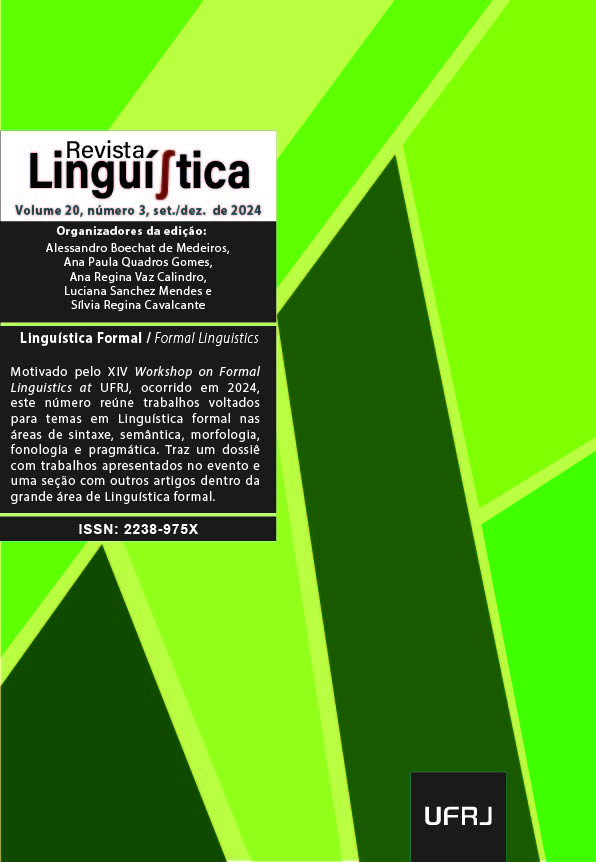Sobre as estruturas sintáticas dos nomes de entidade
DOI:
https://doi.org/10.31513/linguistica.2024.v20n3a65594Abstract
The aim of this paper is to examine Brazilian Portuguese (BP) Entity Nouns, focusing on its derivational history and argument structure. The methodology entails the adoption of the Distributed Morphology (DM) theoretical framework, from which two procedures are developed: (i) a concise examination of the existing literature on nominals that denote entities, and (ii) a qualitative-interpretive analysis of BP data to ascertain whether their behaviour aligns with the predictions set forth in the literature. The data set under examination encompasses derived nominals, which may be either morphologically simple (i.e., nominalizations of roots, such as in jogo ‘game’ and mesa ‘table’) or more complex (with the presence of additional functional layers, including overt categorizing morphemes, such as in pagamento ‘payment and notificação ‘notification/notice). These nouns are incorporated into contrived sentences (a procedure characteristic of Transformational Generative Grammar endeavors, with the objective of forcing the desired interpretation and verifying negative data). The results demonstrate that Entity Nouns can exhibit the same functional structures as Eventuality Nouns. Consequently, they can be deverbal and display an argument structure, including the explicit presence of arguments. This evidence substantiates the assertion that Entity Nouns do not exhibit radical morphosyntactic differences from Eventuality Nouns.
Keywords: Nominalization. Morphosyntax. Morphosemantics. Distributed Morphology,
Downloads
Published
Issue
Section
License
Copyright (c) 2025 Revista Linguí∫tica

This work is licensed under a Creative Commons Attribution-NonCommercial 4.0 International License.
Authors who publish in the Revista Linguí∫tica agree with the following terms:
The authors maintain their rights, ceding to the journal the right to first publication of the article, simultaneously submitted to a Creative Commons license permitting the sharing with third-parties of published content as long as it mentions the author and its first publication in the Revista Linguí∫tica.
Authors may enter into additional agreements for the non-exclusive distribution of their published work (for example, posting in online institutional or non-profit repositories, or book chapters) so long as they acknowledge its initial publication in the Revista Linguí∫tica.

The journal Revista Linguí∫tica is published by the Post-Graduate program in Linguistics of UFRJ and employs a Creative Commons - Attribution-NonCommercial 4.0 International (CC-BY-NC).









